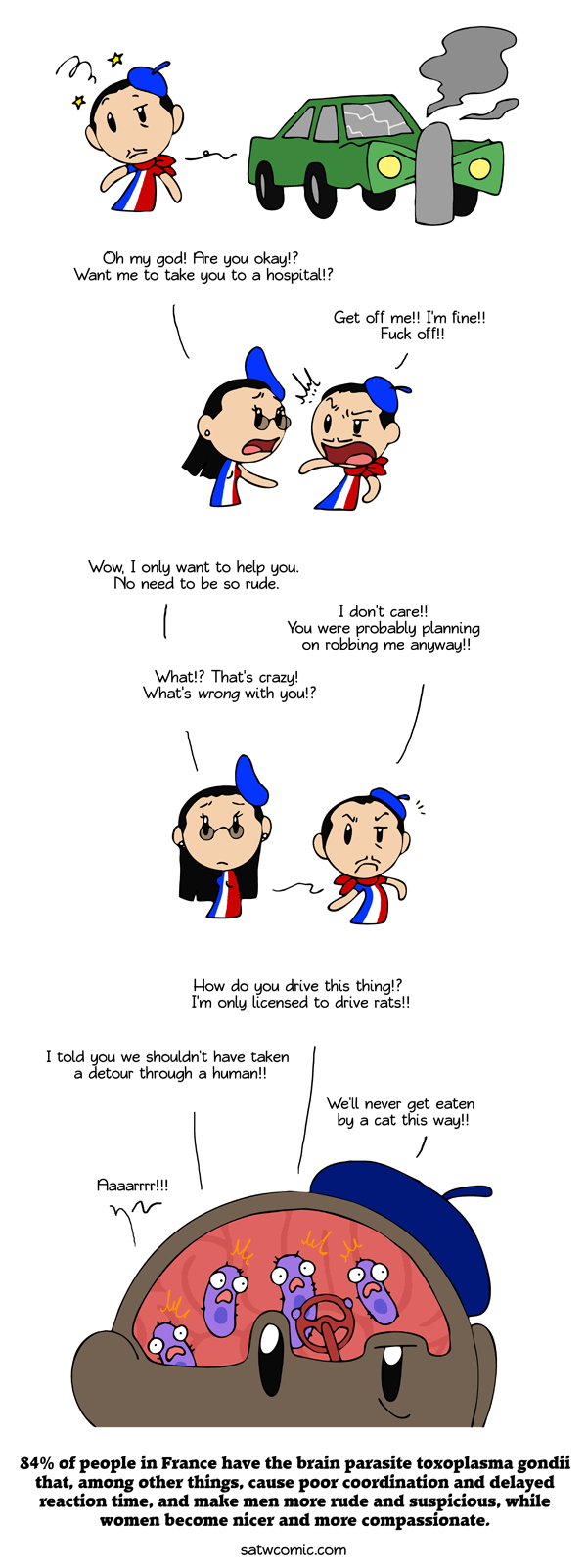
Take the wheel
As promised, an explanation for why people in France drive so hazardly.
Toxoplasma gondii has a life cycles dependent on cats and rats and its effect on the brain is meant to make it easier for cats to catch rats, but sometimes cat excrements end up in farm animals' food, infecting them and passing it on to us. You only risk infection from meat if you don't cook it properly so it's mostly a problem in countries where heating meat can be a problem. France is the only European country where so many people are infected because French cuisine involves so much raw or mildly cooked meat.
This is of course not the only reason why French people are such aggressive drivers, but it does seem to be strongly linked to toxoplasma gondii.
(Also, if people don't want to get help after an accident, get help anyway because they might have brain damage)
France
14th June 2016
10 years ago #9493137
9
0
I really hope people understand that it's not actually true. 84% of people in France at some point in their lives had the parasite and developed the antibodies to it, so they don't actually have the parasite anymore.
10 years ago #9494672
6
0
Woahh! I can't believe there is some people that really believe that explanation! This is a comic for god's sake everything is to take with second degree!
But let's get some facts right:
1- Toxoplasma gondii is a parasite adapted to cats and rats. They are not adapted to humans and we are just accidental hosts. Does it influences rat's behavior? Yes, because Toxoplasma adapted in such a way so that it can end his cycle in the cat (which is the definitive host).
2- Toxoplasma is a parasite found worldwide. Around 50% of the world population is or was infected at some point.
3- In humans, toxoplasma produce symptoms of mild cold, usually we don't even realize we were infected. Where it is dangerous is for pregnant women, because the parasite affect the foetus. But that's only if the woman doesn't possess an inmunity against it, meaning that she has never been in contact with the parasite at some point on her life. Otherwise our body can easily fight it. That's why they say that pregnant women should be careful with cats.
4- Prevalence means you possess INMUNITY against the parasite. It doesn't mean necesarly you have the parasite right now, just that you were infected at some point in you life and you developped an inmunity. When they say 84% is infected, you are talking about the prevalence and it means that 84% of the population was infected at some point in their life and have inmunity.
5- Prevalence is high in countries where people lives a lot with cats. Prevalence is high in UK, Spain, Germany, France, etc...
6- Personally I don't think that French are more agressive driving than any other country (except those who live in Paris, but Paris is like another world for French xD), you should go to Roma one day...
7- Recent studies demonstraded..... nothing. Really, right now the studies doesn't have any relevant information and don't have any definitive conclusion.
Otherwise nice comic as always!
But let's get some facts right:
1- Toxoplasma gondii is a parasite adapted to cats and rats. They are not adapted to humans and we are just accidental hosts. Does it influences rat's behavior? Yes, because Toxoplasma adapted in such a way so that it can end his cycle in the cat (which is the definitive host).
2- Toxoplasma is a parasite found worldwide. Around 50% of the world population is or was infected at some point.
3- In humans, toxoplasma produce symptoms of mild cold, usually we don't even realize we were infected. Where it is dangerous is for pregnant women, because the parasite affect the foetus. But that's only if the woman doesn't possess an inmunity against it, meaning that she has never been in contact with the parasite at some point on her life. Otherwise our body can easily fight it. That's why they say that pregnant women should be careful with cats.
4- Prevalence means you possess INMUNITY against the parasite. It doesn't mean necesarly you have the parasite right now, just that you were infected at some point in you life and you developped an inmunity. When they say 84% is infected, you are talking about the prevalence and it means that 84% of the population was infected at some point in their life and have inmunity.
5- Prevalence is high in countries where people lives a lot with cats. Prevalence is high in UK, Spain, Germany, France, etc...
6- Personally I don't think that French are more agressive driving than any other country (except those who live in Paris, but Paris is like another world for French xD), you should go to Roma one day...
7- Recent studies demonstraded..... nothing. Really, right now the studies doesn't have any relevant information and don't have any definitive conclusion.
Otherwise nice comic as always!
9 years ago #9557104
4
0
I love how it makes the men more rude and suspicious, but it just makes women nice and compassionate.
Looks like parasites are sexist XD
Looks like parasites are sexist XD
10 years ago #9493068
3
0
Never heard of toxoplasmosis behaving differently in women, only heard of it causing paranoia and aggression in anyone regardless of sex. Even in popular culture it's more well known to cause paranoia and aggression in females than anyone else, hence the "crazy cat lady". Googling just now i couldn't find anything about this "nicer and more compassionate" affect on women either. There was a note that some of the behavioural changes may be sex based, but nothing really clarified on how so and in general the nature of these effects are poorly studied.
I did find this neat little (unrelated) tidbit though:
"There is a negative association between an infection with the parasite T. gondii and multiple sclerosis, therefore, researchers have concluded that toxoplasmosis infection could be considered a protective factor."
In other words, being afflicted with toxoplasmosis /might/ help prevent the development of MS. That's pretty neat.
I did find this neat little (unrelated) tidbit though:
"There is a negative association between an infection with the parasite T. gondii and multiple sclerosis, therefore, researchers have concluded that toxoplasmosis infection could be considered a protective factor."
In other words, being afflicted with toxoplasmosis /might/ help prevent the development of MS. That's pretty neat.
7 years ago #9794646
2
0
Well, I don't know if this is true, but this is certainly not the whole truth about that.
First, almost all non-french think France is Paris because it is the most visited place in France, but it happens to be the worst place to drive in France and there are reasons for that.
The primary reason being that Paris is by far the most densely populated place in all europe (it's actually one of the most densely populated city in the world, rivaling cities like Mumbai or Macau in this field). Add to that the fact that every person in France has a little less than half a car per person and you get probably one of the most traffic jammed place in the whole world.
Not to say that there are more car crashes only because there are more cars, I'd completely agree with you that drivers in Paris are complete douche. But in my opinion, the overcrowding explains both the bigger car crash rate and the douchery of the drivers. I've personnaly witnessed firsthand charming people turning into raging douchebags when going for a drive in Paris. Actually, I have an uncle that acts quite normally when he drives in the countryside but as soon as he enters Ile-De-France (the parisian region), he starts cutting lanes, insuting other drivers...
First, almost all non-french think France is Paris because it is the most visited place in France, but it happens to be the worst place to drive in France and there are reasons for that.
The primary reason being that Paris is by far the most densely populated place in all europe (it's actually one of the most densely populated city in the world, rivaling cities like Mumbai or Macau in this field). Add to that the fact that every person in France has a little less than half a car per person and you get probably one of the most traffic jammed place in the whole world.
Not to say that there are more car crashes only because there are more cars, I'd completely agree with you that drivers in Paris are complete douche. But in my opinion, the overcrowding explains both the bigger car crash rate and the douchery of the drivers. I've personnaly witnessed firsthand charming people turning into raging douchebags when going for a drive in Paris. Actually, I have an uncle that acts quite normally when he drives in the countryside but as soon as he enters Ile-De-France (the parisian region), he starts cutting lanes, insuting other drivers...
9 years ago #9580809
2
3
That's stupid and basically offensive, how did you even get to think this was actually a thing ?
9 years ago #9569455
2
0
Bleh. Thqt story was way out of proportion and didn't even explain it right.
Some 80% of all French have toxoplasma ANTIBODIES. Meaning their body have fought the parasite. Dosen't mean they have an ongoing infection.
Some 80% of all French have toxoplasma ANTIBODIES. Meaning their body have fought the parasite. Dosen't mean they have an ongoing infection.
Add comment: Please Sign in or create an accout to comment.



 Support the comic on
Support the comic on 































34
This...this I would only let 5th grader to write.
This show such and incompetence of understanding infections and blood tests that I can't even....I can't even fathom that a usually well research comic like this would do this!
Yes. Many people, up to 86% of a population have ANTIBODIES against toxoplasma.
That doesn't mean these people has toxoplasma, it only means their immune system at some point fought toxoplasma.
And it certainly dose not mean that 86% of the population has and ACTIVE toxoplasma infection!!!!
Do get your facts right!
Sincerely a Danish teacher in pathology and genetics.